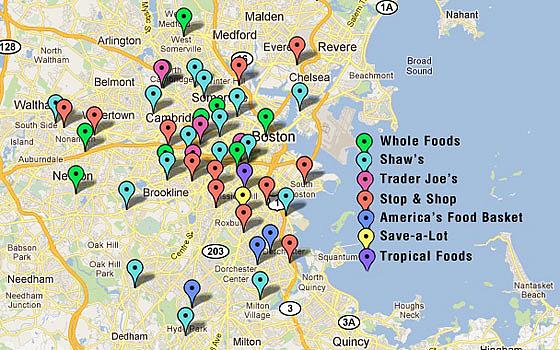The Challenges to Healthy Eating for Low-Income Bostonians - Follow-Up
Image

Published on
December 21, 2011
My National Health Journalism Fellowship project is finally finished and published!
I had been researching pieces of this topic, the challenges to healthy eating for low-income Bostonians, for more than a year before I started the project. I had already conducted a basic survey of food prices in Boston (and had a general sense of how quickly food prices were rising), figured out where the major grocery stores were located throughout the city, profiled some prominent local food activists, and read a lot of the background literature. But even with all of this preparation, my research for this project was difficult and surprising.
Difficulties:
- Getting around in poor neighborhoods was extremely time consuming and tiring. There are virtually no subways that run through Roxbury and Dorchester, so I had to take buses everywhere. Buses are slow, and are usually running late, so I was extremely late to some of my interviews. I could only schedule about three interviews each day (if they were in differnet places) because it took so long to get around.
- People in general were very willing to talk to me, but there's such a stigma against junk food and fast food, that people were very hesitant to talk about their unhealthy eating habits. Even when I interviewed people inside McDonald's, they would say, "this is the first time I've been here all year!" or "I just got a salad." That may have been true, but people really wanted to make sure I thought they were doing the right thing. One group of teenagers cancelled their interviews with me at the last minute becuase they were uncomfortable talking about their poor eating habits, and another teenage girl in a barber shop said she'd tell me about what she eats as long as I didn't "make her look bad." It felt like a lot of people were giving me the PR-version of themselves. Even with this, I think I got a lot of good information from my interviews.
Surprises:
- The results of my research were much different than I thought they would be! I had done a story about a year and a half ago about milk prices in Boston. That research showed that milk prices are actually higher in poor neighborhoods than in rich ones--milk is cheapest at Whole Foods! From that I assumed that all food would be more expensive in poor neighborhoods. Some residents were even tipping me off that it has to do with store owners wanting to cash in on WIC and SNAP benefits. But when I actually started looking at the prices of food in Roxbury and Dorchester compared to wealthier neighborhoods like Brookline and Cambridge, I saw this pattern fall apart. Determined to find a solid economic barrier to healthy eating, I decided that instead of a neighborhood price comparison, I would look at the price of healthy food vs. unhealthy food at the grocery stores in poor neighborhoods. I assumed unhealthy food would be much cheaper, since that's what we're told. But I was wrong again. In general, healthy, whole foods are much cheaper than unhealthy, processed items in the grocery store, and are even cheaper than anything you can get at McDonald's. After putting this together I realized that while cost is a barrier for many who can't afford any food, the perception of the high cost of healthy food is another obstacle for many others.
- After reading so many reports about how much fast food Americans eat everyday, I assumed that everyone at McDonald's would be addicted to junk food. But I was wrong about that too. I had several thoughtful conversations with customers, who explained that McDonald's was simply the cleanest, safest place for them to relax outside their homes. After hearing this, I went back and surveyed the restaurants in the neighborhood, and they're right--McDonald's is not only the largest restaurant, but one of only three that you can sit down in, and the other two are small enough that you wouldn't be able to sit there for too long. There also aren't many outdoor spaces where people can sit and talk, unlike neighborhoods like Cambridge and Brookline where there are plenty of benches and trees where people can hang out. I had thought that I would just need to tell people how bad McDonald's was to get them out of there, but in reality there's a lot more work to be done than just informing them of McDonald's nutrition facts (plus most already know how bad it is for them). Getting people out of McDonald's is going to take more than information--it's going to take rebuilding poor neighborhoods.

